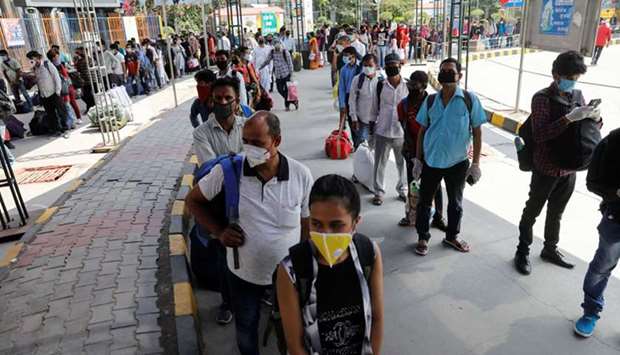Long queues stretched outside railway stations in major cities yesterday as authorities eased a nationwide lockdown despite a record daily spike in coronavirus cases.
Rail services, apart from the movement of some essential cargo, were abruptly halted in late March ahead of efforts to contain the virus that froze almost all economic activity, putting millions out of work overnight.
But as New Delhi tried to get the economy moving again, officials reported 8,392 fresh coronavirus infections - the steepest daily increase yet - taking the toll to more than 190,000 cases with over 5,000 dead.
At least 149,000 passengers boarded trains yesterday as Indian Railways ramped up the number of journeys from 30 to 200.
Almost 2.6mn people are booked to travel in June on interstate trains - a network which normally carries over 20mn passengers a day, the railway ministry said.
Railway police in the southern city of Secunderabad organised passengers into two 500m-long queues outside the station under the sizzling summer sun.
Many waited in line hours before their journeys.
Carrying large bags of belongings and some with young children, passengers’ temperatures were taken with scanners before they were allowed into the building, with many wearing masks but not observing social distancing.
At New Delhi railway station, some people waiting outside were unable to get a sought-after ticket.
Deepak, a jobless hotel waiter who only gave his first name, said he wanted to go to his home state of Madhya Pradesh - but was forced to travel to Uttar Pradesh as there were no tickets.
“It’s important for me to get home. I have no money to live here. A lot of people have walked home. They are so desperate,” the 32-year-old said.
Another man, who asked to remain anonymous, said he would buy a ticket for a more expensive domestic flight after failing to get a seat.
“The government is only creating chaos. Nothing else,” he said, adding that train tickets were sold out online within minutes of reservations being opened.
Millions of migrant workers were left stranded in cities far from their home villages when the lockdown was announced in March.
The government eventually introduced special train and bus services from last month, following reports that many walked for days to get home, with some dying from exhaustion or accidents on the way.
lA queue of ambulances formed outside the main crematorium in New Delhi yesterday, as the number of deaths from the coronavirus continues to rise.
At Nigambodh Ghat on the banks of the Yamuna River, relatives and staff said a shortage of medical professionals trained in handling the bodies of victims was leading to delays.
Ash floated from the funeral pyres, adding to the heat of the summer, where temperatures in Delhi have already reached 47 degrees Celsius.
Surendra Mohan Gupta, the brother of 50-year-old coronavirus victim Virendra Gupta, said his family had paid Rs20,000 to a private ambulance firm.
“It’s very expensive but we are still waiting for them,” he said, as other family members argued with crematorium staff over the delay.
“The body has to stay in the ambulance until our number is called. Sometimes I have to wait for almost five hours,” said ambulance driver Jai Kumar, sweat pooling in his surgical gloves.
The Hindustan Times newspaper reported on May 28 the crematorium had to send eight bodies back to a hospital after several of its electric furnaces failed.

Passengers stand in a queue outside a railway station to board a train in New Delhi yesterday.
